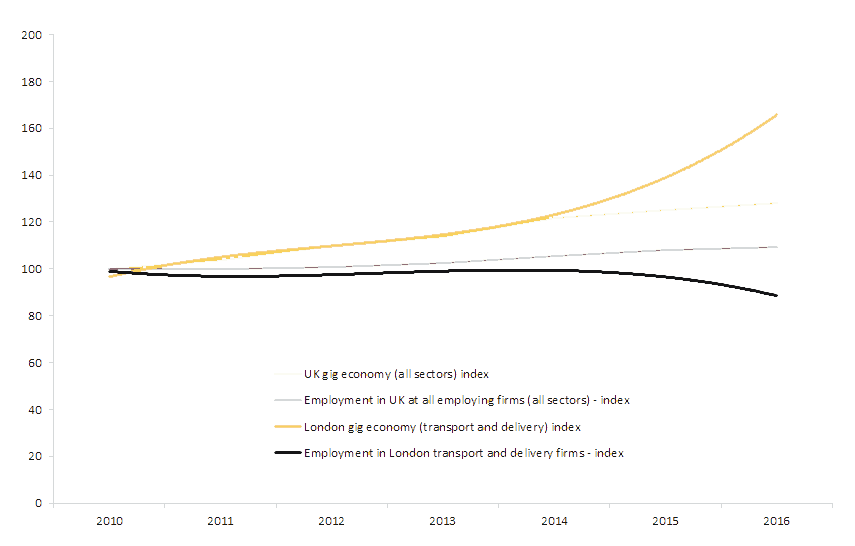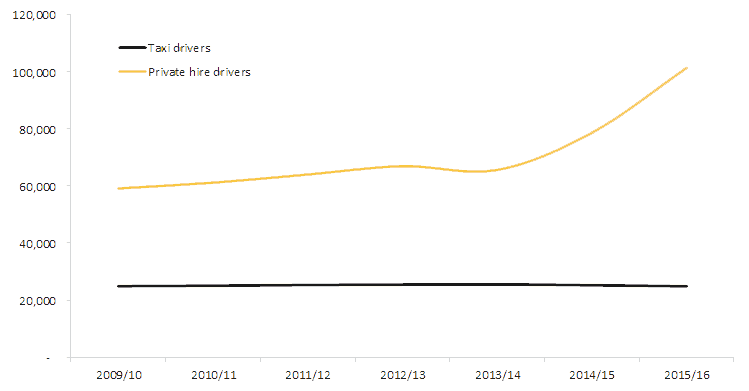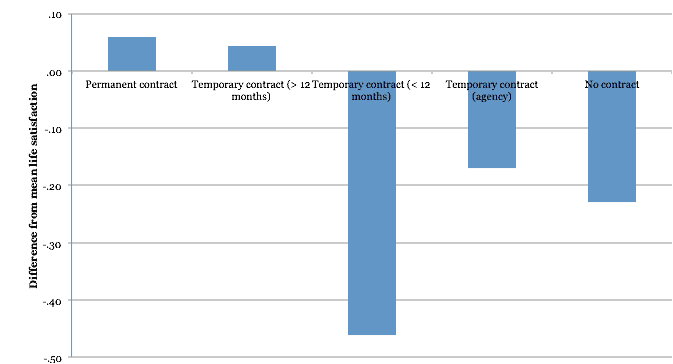Massive surge in London’s gig economy
London's gig economy has grown by 72% since 2010
09 December 2016
Official figures show that London’s gig economy — people getting paid for individual tasks, like delivering a package, rather than for jobs — has grown by 72% since 2010.
The data records the number of non-employing firms — these are businesses that do not employ anyone other than the proprietor, and would include most people working in the gig economy. It also shows the level of employment in firms that do employ at least one other person.
Figure 1 shows that there has been a 28% growth in the overall number of non-employing businesses in the UK (light yellow line) and less growth in employment at other businesses (light grey line), but the trends in London’s transport and delivery sector (where we expect to see the greatest impact from the gig economy) are much starker (darker yellow and grey lines) with a 72% growth in the gig economy in London since 2010.
Figure 1: Non-employing firms are growing much faster than other types of employment.

Source: NEF analysis of ONS Business Population Estimates[footnote]Trendlines are shown for London transport and storage data due to smaller sample sizes[/footnote]
The same trend can be seen in data on the number of taxi driver licences in London. Figure 2 shows a surge in private hire drivers (which would include Uber drivers) at the same time as the surge observed in Figure 1 (i.e. around 2014).
Figure 2: Number of taxi licences by type.

Source: NEF analysis, TfL
Platform companies warding off competitors
New platform companies that employ gig workers, including Uber and Deliveroo, have pioneered highly successful business models that harness the technology of mobile broadband, GPS and online payment to connect users and providers of a service. Critically, they have aggressively warded off or absorbed competitors in order to create a monopoly. In the current system there is no incentive for these platform monopolies to forego their market position by making their platform open and our current regulatory system is not equipped to treat these industries as the monopolies (or oligopolies) that they are. The legal system isn’t even clear yet on exactly what they are.
A typical economic solution to market abuse by a single firm is to encourage more competitors in the market. This is difficult for platform companies since the network effects make many of these natural monopolies. Rather than the blooming of a thousand flowers, as the digital economy was supposed to encourage, we have seen the emergence of extremely powerful tech giants whose business model is to achieve market dominance and then reap the rewards. For example, Uber’s main competitive advantage is its deep pockets, which it can use to engage in aggressive loss-making competition to establish itself as a single provider.
Growth of precarious work and erosion of workers’ rights hurts the economy and worker wellbeing
This business model is highly concerning for the workers that use the platform. Until a recent court case, platform companies typically required their providers to operate as a single-person business, with no claims to employment rights, including the minimum wage. In this way, platforms profit from the labour of providers without assuming any responsibility for them. Providers therefore have no protection from low pay and excessive hours, and in some cases could face a disciplinary cut-off from the platform, which prevents them from earning at all.
As Uber grows, wages are being driven down across the taxi sector. In a recent survey 9 out of 10 London private hire drivers, some working for Uber, some not, claimed that their take home pay had decreased over the last 6 months. Only one in five of them feel they can earn enough through driving to support their families. Flexibility is valuable to many of these workers, but flexibility and high working standards are not mutually exclusive.
This is also a problem that is wider than the gig economy. A succession of low unemployment figures hides a growing number of people without the security of a regular wage, a pension or full employment rights. Research by the New Economics Foundation showed that only 61% of the labour force has a secure job that pays at least the living wage, and this has been deteriorating for the past 4 years.
As the New Economics Foundation’s research has found, the erosion of collective bargaining powers for workers creates a downward economic spiral. Wages are an essential source of demand in the economy because they allow people to spend. In the wage-led economy like the UK, low wages are bad for the whole economy.
Evidence on the determinants of wellbeing at work provides cause for concern that the increasing prevalence of gig work, and casualised working more generally, will be highly detrimental. Even after controlling for income, having a short-term, temporary contract is associated with significantly lower wellbeing (see Figure 3) and working long hours is associated with substantially higher incidence of tension, stress and worry.
Figure 3: Wellbeing impacts of temporary work

Source: European Quality of Life Survey, 2011
The platform workforce is highly individualised: in a sector based on networked technologies it is ironic that there are very few ways for workers to communicate with one another. The platform economy has ever fewer communal spaces where workers meet and socialise, so the typical methods of union organising no longer work in the same way. We need meaningful and comprehensive opportunities for workers to organise among themselves to protect their interests. For example, one demand could be that providers that use a platform should be able to freely communicate with one another through the platform, without surveillance.
This way of working — creating and monopolising a market, then weakening the power of workers to maintain a dominant position — is crucial to the business plan of platform companies, so there is considerable doubt about the implications of a recent UK employment tribunal’s ruling that Uber drivers are employees, not independent businesses. This change to the classification system could afford many gig workers more rights and higher standards at work.

Credit: Martin Deutsch
What needs to change?
- New ownership models: The technology used by companies like Uber was once cutting edge, but is now fairly easy to replicate. The competitive advantage Uber has over existing minicab firms is their ability to loss lead financially(sell a service at a loss), offering low rates to customers by creating a surge in drivers, and the network effect they achieve through integrating with other online services like Google Maps.If drivers owned their own app, affordable rates and convenience for customers could be maintained whilst localised network effects could be achieved. For example, in cities where Uber has not yet won a dominant market share, public and local procurement of taxi, community transport and courier services from a driver owned app could present a viable alternative. To do so, the technology would need to be integrated into local public transport networks as well as meta-networks like Google Maps.
- Technology enabled collective action: Better preparing workers and trade unions for workplace organising in the future world of work, such as: big employee data, automated HR, monopolising employers and the challenges they present for issues such as racism and discrimination, blacklisting and union-busting, and exploitation.
- Facilitate competition: Data portability would enable us to easily move our data and profile from one platform to another. So if I’m not happy with Uber any longer I would be able to transfer my exemplary ratings history to another platform. This overcomes some barriers to switching, but doesn’t fundamentally alter the natural monopoly characteristic of networks. A further step would be to require platforms to allow free access to their user and provider pools for other platforms — so an Uber driver might pick up a customer from Gett. In this model no single platform would be allowed to become the gatekeeper to a service.
Topics Work & pay






